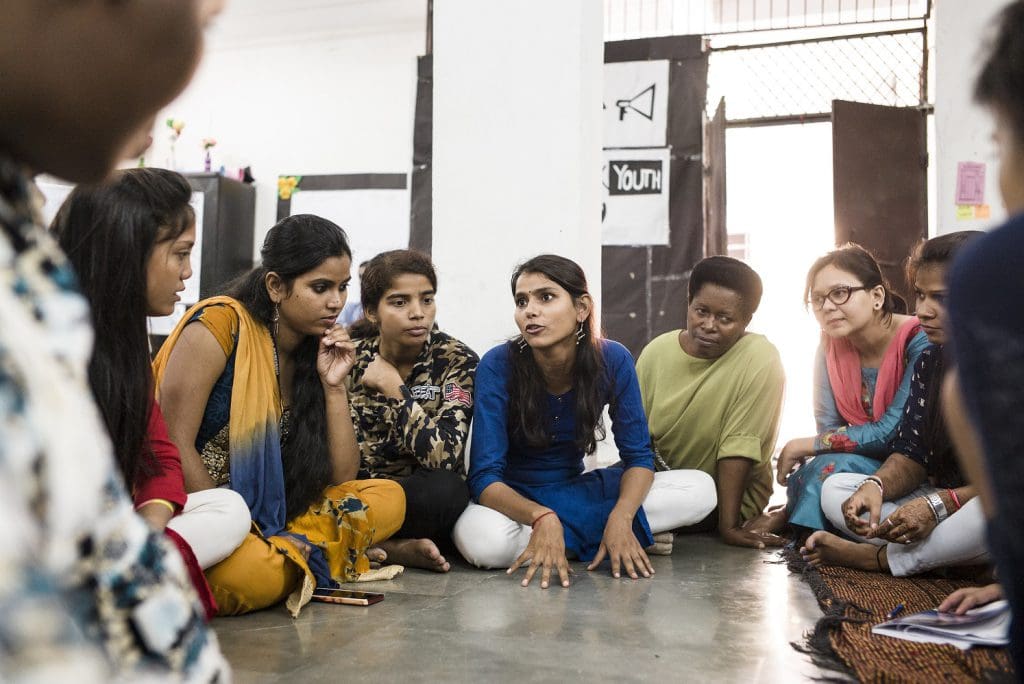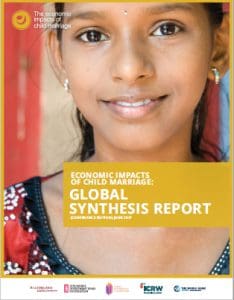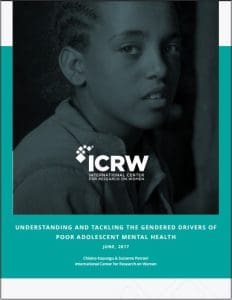
ICRW celebrates top ten moments of 2017
19 December 2017
Media Contact
Amid the challenges of 2017, ICRW has a lot to celebrate.
2017 has been a tumultuous year the world over. We’ve been challenged in unprecedented ways and yet, exciting opportunities have arisen and new successes achieved. At ICRW, we have never been more motivated to do what we do best: produce impactful gender research and smart evidence-based advocacy to create better opportunities for women, girls and vulnerable communities across the world. Thank you for your support in helping us move forward our critically important work. As we usher in the new year, we’d like to take a moment to recognize ICRW’s top ten successes from 2017, as selected by our stellar staff. Enjoy!

1. Measuring the Economic Cost of Child Marriage
 For nearly two decades, ICRW has been the leading voice in efforts to end child marriage. This year, we concluded a multi-year project examining the issue in a whole new light: economically. Working with the World Bank, we released findings documenting the economic impacts of this harmful practice across countries and domains, including labor force participation and educational attainment. Our results concretely prove that child marriage is costing countries trillions of dollars each year and that ending the practice is not only a human rights concern, it also makes good economic sense.
For nearly two decades, ICRW has been the leading voice in efforts to end child marriage. This year, we concluded a multi-year project examining the issue in a whole new light: economically. Working with the World Bank, we released findings documenting the economic impacts of this harmful practice across countries and domains, including labor force participation and educational attainment. Our results concretely prove that child marriage is costing countries trillions of dollars each year and that ending the practice is not only a human rights concern, it also makes good economic sense.
2. Making the United Nations More Feminist
With the arrival of the new United Nations Secretary General, ICRW released a set of recommendations and agenda for actions that could be taken by the new leader to make the UN more feminist – both inside and out. The recommendations together offer a concrete pathway for the United Nations to champion women’s rights and gender equality through its internal policies and practices, as well as in external programs that it advocates for and supports.
3. Women Pull Up a Chair at the Peacemaking Table
After years of advocacy with our coalition partners and community, ICRW welcomed the passage of the Women, Peace and Security Act, and celebrated its signing into law. This law ensures that women’s experiences with conflict and the role they play in preventing and resolving conflict is elevated across the full spectrum of U.S. foreign policy, and even overseen by Congress. This means that the law requires the United States to have a strategy that ensures women’s needs are prioritized when addressing conflict and their voices are heard in peace and reconciliation efforts.
 4. ICRW’s Flagship Programming Platform Soars
4. ICRW’s Flagship Programming Platform Soars
Over the last decade, ICRW has built, implemented, evaluated and scaled an array of signature programs that have been making a substantial difference in the lives of women and girls across India. Improved outcomes in education, employability, health, and empowerment, our programs have been doing it all. We are proud of the continued successes our flagship programming platform: P.A.C.E., PAGE, PAnKH, Parivartan, and Plan-it Girls. For an example of how these programs are making an impact, check out the report on our website outlining recent findings from our PAGE program, which aims to build empowerment and employability for girls aged 15-17.
5. A Deepening Presence in Africa
 Following over three decades of work in sub-Saharan Africa, ICRW Africa was officially launched last year in Kampala, Uganda. Over the course of the last year, we have established an office, grown our staff, expanded our partnerships, took on new and exciting research projects, and even led the first trip showcasing our work in the region to friends of ICRW. Importantly, we have also become registered as a locally based nonprofit, to be known as ICRW Uganda, which will allow us to do even more with our local partners in Ugandan communities.
Following over three decades of work in sub-Saharan Africa, ICRW Africa was officially launched last year in Kampala, Uganda. Over the course of the last year, we have established an office, grown our staff, expanded our partnerships, took on new and exciting research projects, and even led the first trip showcasing our work in the region to friends of ICRW. Importantly, we have also become registered as a locally based nonprofit, to be known as ICRW Uganda, which will allow us to do even more with our local partners in Ugandan communities.
6. Our Insights to Action – Relaunched!
We are proud to be a global thought leader and this year, we brought back our monthly public discussion series, Insights to Action, hosted in our new state-of-the-art convening space in Washington, DC. We kicked off the new series around International Women’s Day with a discussion on women’s economic empowerment across sectors. Since then, we’ve held engaging dialogues on topics ranging from inclusive energy, to the data gap on sexual and gender minorities, financial inclusion, and girls’ empowerment, employability and education.
7. A Royal Visit
The ICRW Asia office in India was delighted to host Her Majesty the Queen of the Belgians for a special visit to our Plan-It Girls project in Delhi. Her Majesty is a member of ICRW’s Leadership Council and a steady supporter of our work worldwide. Plan-It Girls is a program for adolescent girls in grades 9 and 11 that aims to build their agency and promote gender equality at the local level through a school curriculum based on gender-integrated life-skills and employability skills. Her Majesty met with young participants in the program during the visit, who performed a skit about the program, in addition to engaging in a dialogue with the Queen.
8. Raising the Profile of our Work on Care
 This year ICRW took our research on unpaid care – the brunt of which falls to women and girls – to the next level by participating in the United Nations High Level Panel on Women’s Economic Empowerment, where we supported the development of a policy brief and toolkit. ICRW conducts research to recognize, reduce and redistribute unpaid work as a means to increase women’s income, reduce their time poverty, improve the gender division of labor within and beyond the household, and reduce labor market segmentation.
This year ICRW took our research on unpaid care – the brunt of which falls to women and girls – to the next level by participating in the United Nations High Level Panel on Women’s Economic Empowerment, where we supported the development of a policy brief and toolkit. ICRW conducts research to recognize, reduce and redistribute unpaid work as a means to increase women’s income, reduce their time poverty, improve the gender division of labor within and beyond the household, and reduce labor market segmentation.
9. The Gendered Drivers Behind Poor Adolescent Mental Health
After raising the alarm that self-harm had become a leading cause of death among adolescent girls worldwide, ICRW has been working to better understand the recent phenomenon, and this year we released a paper discussing what we currently know. The paper maps out the connections between gender, adolescence and mental health in an effort to help guide a research and program agenda moving forward that will uncover root causes and build lasting solutions.

10. Understanding Online Gender-Based Violence
The problem of gender-based violence (GBV) initiated through technology or the internet – manifesting as virtual threats and harassment, as well as physical violence – is of growing global concern. ICRW is conducting new cutting-edge research to understand and uncover the many ways that online or technology facilitated GBV manifests itself. We are creating comprehensive measures to assess its prevalence and impact, with the aim of equipping the tech industry with the knowledge and tools to create a safer, more inclusive online experience.
We could not have achieved these top ten moments without the support of people like you. Please consider making a contribution to ICRW to help support our work in 2018.
